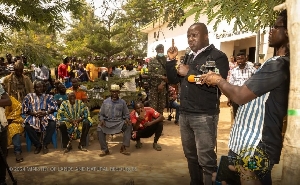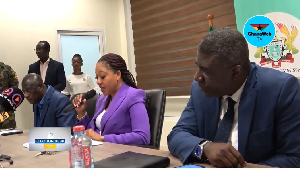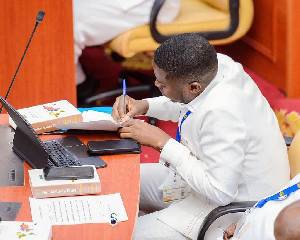The government has signaled its readiness to work with investors to assess and exploit – on a large-scale basis – the vast mineral resources in Dollar Power, a boundary town in the Bole District of the Savannah Region.
According to the Minister of Lands and Natural Resources, Samuel Abu Jinapor, preliminary geological data and investigations suggest that the enclave is rich in gold deposits.
It is on the back of this that he called on the private sector to partner with the government to undertake further geological works in the area which will lead to investment into production of gold.
The minister, who was speaking at a durbar with the chiefs and people of the community, said the government is also considering granting community mining permits to those interested and working in the area.
This follows a visit to inspect the progress of work roads and other infrastructure projects in Dollar Power by the Minister and a team from the Ministry of Roads and Highways.
Dollar Power, formerly known as Sindi, is a community along the Ghana – Ivory Coast International Boundary Line in the Savannah Region. It lies about 20 kilometers (km) from the district capital, Bole.
It is understood that in 1928, the colonial governments of the then Gold Coast (Ghana) and Ivory Coast, established an International Boundary Line between the two countries, with the erection of Boundary Pillars at mutually agreed positions.
This Boundary Line was reaffirmed by the two countries in 1973 with the planting of teak trees along the border.
The large deposits of gold in the area, however, attracted people from across both countries, whose activities have led to the destruction of Boundary Pillars and the teak trees.
In 2005, Ghanaians moved to the area to mine gold and prevent Ivorians from exploiting the resources, and now, around 3,000 people live in the area and engage in small-scale mining.
The gold deposits in the area made the people name parts of the community Dollar Power Obuasi.
Since 2021, the Ministry of Lands and Natural Resources has been collaborating with the Ghana Boundary Commission, as well as their counterparts in Ivory Coast, to confirm and reaffirm the boundary lines between the two countries.
Additionally, the ministry has been working closely with the traditional leaders and residents to regulate small-scale mining activities in the area.
In a bid to attract the needed investmen,, the government is constructing a 24 km feeder road from Ntereso in the Bole District to Dollar Power.
Additionally, another 25 km feeder road from Sapelliga in the Upper East Region to Dollar Power is also being built. This is especially important since the community is currently only accessible by water.
The constructions being undertaken by the 48 Engineers of the Ghana Armed Forces are said to be far advanced and expected to be completed by the middle of this year.
The minister urged the public to support the government in regulating mining operations and to act as watchdogs to identify and report illegal mining activities, particularly in river bodies.
On behalf of the people, the Chief of Dollar Power, Sindiwura Mahama Awudu Abott, thanked the government for the road construction which will link the community to other parts of the country.
He said the construction has enhanced economic and social activities in the area and will ensure effective border control when completed.
Chief Mahama Awudu also recognized the government’s commitment to establishing a community mining scheme in the area, as well as bringing large-scale mining operations.
He appealed to the government to construct a bridge over the Black Volta to improve transportation and trade, as well as to enhance the safety of community members.
Additionally, he urged the restoration of the Boundary Pillars and teak trees that were destroyed, to secure the safety of the border and prevent encroachment.
Business News of Friday, 2 February 2024
Source: thebftonline.com

















